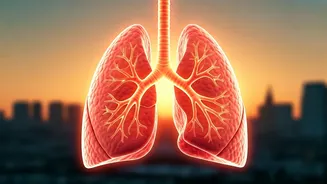Diwali's Aftermath: AQI Surge
Following Diwali celebrations, Delhi often experiences a significant surge in Air Quality Index (AQI) levels. This rise is primarily attributed to the
widespread use of firecrackers, which release harmful pollutants into the atmosphere. The pollutants, including particulate matter, nitrogen oxides, and sulfur dioxide, can severely affect air quality, leading to a noticeable deterioration in the city's environment. This period is critical for residents, as prolonged exposure to such high levels of pollution can cause various respiratory issues and other health complications. The immediate aftermath of Diwali often sees AQI levels soaring to hazardous categories, impacting everyone regardless of age or health status. Therefore, being aware of the causes and understanding how to protect oneself is essential during this time.
Lung Impact: Health Risks
The elevated AQI levels post-Diwali pose a direct threat to lung health. Exposure to high concentrations of pollutants irritates the airways, leading to various respiratory problems. For individuals with existing conditions like asthma or chronic obstructive pulmonary disease (COPD), the effects can be significantly worse, potentially triggering severe flare-ups. Even healthy individuals may experience symptoms such as coughing, wheezing, shortness of breath, and chest tightness. The fine particulate matter present in the air can penetrate deep into the lungs, causing inflammation and increasing the risk of respiratory infections. Prolonged exposure can lead to long-term health complications. Additionally, the pollutants can also trigger allergic reactions, impacting the overall well-being of the affected individuals. The severity of the impact varies, but the risk remains consistent, urging preventative measures.
Breathing Easier: Protective Measures
Several practical measures can be taken to mitigate the effects of high AQI levels and protect lung health. Pulmonologists recommend staying indoors as much as possible, especially during peak pollution hours. When venturing outside, wearing a high-quality N95 mask is crucial. This mask effectively filters out harmful particles and prevents them from entering the respiratory system. Using air purifiers indoors can further enhance air quality, ensuring a cleaner environment for breathing. Avoiding strenuous activities outdoors can reduce the intake of polluted air. Moreover, staying hydrated and consuming a healthy diet that boosts immunity can strengthen the body's natural defenses against the adverse effects of air pollution. Monitoring the AQI regularly through official channels and adjusting daily activities accordingly is a proactive approach to maintaining respiratory health.
Consulting Medical Professionals
Given the severity of post-Diwali air pollution, consulting medical professionals becomes important if you experience respiratory symptoms or have pre-existing conditions. If you experience coughing, wheezing, difficulty breathing, or chest pain, seek medical attention immediately. A pulmonologist can diagnose and provide appropriate treatment. For those with chronic conditions like asthma or COPD, it is wise to consult a doctor to adjust medications and management plans. Regular check-ups and follow-ups with medical experts can help in keeping the lungs healthy and managing the adverse effects of air pollution. The doctor can also provide personalized advice and guidance tailored to individual health needs. They can assess the severity of the impact and suggest suitable interventions.
Government Guidelines Compliance
Compliance with government guidelines on crackers and pollution control is essential for managing the adverse effects of post-Diwali air pollution. Following the guidelines set by the Supreme Court can reduce the release of pollutants into the atmosphere. The use of 'green crackers' that emit less harmful substances than conventional firecrackers should be adopted. Monitoring and enforcement of pollution control measures are critical to manage the situation. Awareness campaigns about the impact of air pollution and the importance of compliance with the guidelines help in creating a responsible community. These collective efforts are essential in reducing pollution levels and protecting the public from the health hazards associated with high AQI.














